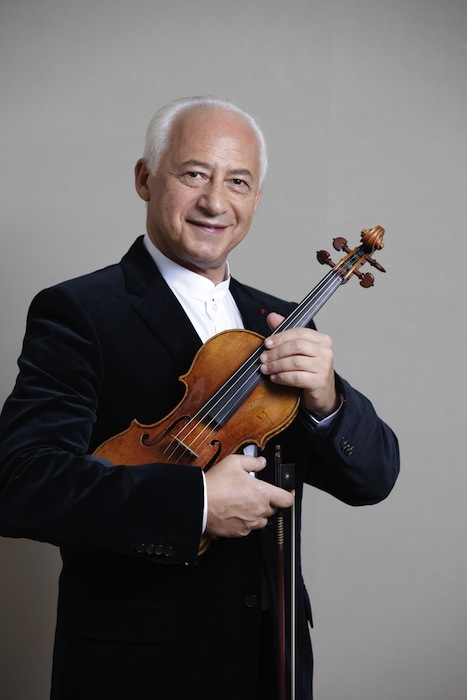Spivakov, Moscow Virtuosi mark nearly 40 years of a successful partnership
In the late 1970s, the Soviet Union stood at a standstill. The Brezhnev era brought new attention to militarism and nuclear weapons. In 1979, the Soviets invaded Afghanistan, leading to a war that would signal the beginning of the end of Soviet dominance.
Cultural life was stagnant. “Nothing new could be done, in theater, in different cultural activities,” said Vladimir Spivakov in a phone interview from his hotel in Perm, Russia.
Spivakov, then a promising young violinist and conductor, decided to form his own chamber orchestra. He assembled players from friends and artistic associates, many of whom had been winners of international competitions and had performed with leading orchestras in Moscow. The ensemble would come to be known for its fizzing corporate musicianship, and the name, Moscow Virtuosi, captured that bravura and personality.
It was an uncommon practice for a single artist to launch an orchestra at that time. The Soviet government was the only entity that could authorize and establish professional theaters, orchestras, and other cultural bodies. Sponsorship, too, fell upon those ensembles that were considered to be on the same artistic level of major European and US orchestras. It took Spivakov and his ensemble several years to convince the government that they were worthy of support.
In the meantime, Spivakov and his ensemble rehearsed in basements and shabby out-of-the-way venues. They could not book major concert halls.
But the orchestra’s luck turned in 1981, when Pravda ran a favorable review of one of their concerts. “Pravda can kill and Pravda can give life. And this was the case when Pravda gave life,” Spivakov recalled. Two years later, the Soviet Minster of Culture established the Moscow Virtuosi as a state orchestra.
Today, Spivakov and his colleagues stand in the vanguard of the most celebrated international chamber orchestras. They have made numerous recordings and embarked on successful concerts tours of Europe and the United States.
This week the Moscow Virtuosi kicks off a U.S. tour that will feature stops in Boston, New York, Washington, Chicago, Los Angeles, and San Francisco. Soprano Hibla Gerzmava and young cellist Danielle Akta are guest soloists for these concerts.
The orchestra’s sound owes much to its leader. Spivakov, now 72, has enjoyed a high-profile career as a violin virtuoso, having performed under the batons of many of the greatest conductors of the twentieth century. He studied conducting under Izrail Gusman, a friend of Shostakovich, and later with Leonard Bernstein, who gave Spivakov a special baton in recognition of his talent and promise.
In the days of the Soviet Union, the Moscow Virtuosi were restricted to playing music by conservative and now unknown Soviet composers while avoiding more edgy and politically controversial modernists.
But with the fall of the Berlin Wall and collapse of the communist government, the orchestra enjoyed a newfound freedom. Their repertoire, as a result, grew to include a wide range of works. “Of course we play romantic music, but we play modern composers, like Schnittke, Arvo Pärt, Stravinsky, and Penderecki,” Spivakov said. “And this gives us a great vision of the music world.”
But the Virtuosi also perform a great deal of Baroque and Classical music with a sound that has the same rich radiance of an ensemble steeped in romanticism.
“We play on good Italian instruments, [but] it’s not necessary to play with the eighteenth-century bow,” the conductor said of the orchestra’s approach to early music. “The most important is experience. And of course it’s a special style [like] ornamentation, things which you have to study and to understand. But if you know this then you can perform on modern instruments in the right way.”
To create the orchestra’s unique sound, Spivakov also drew inspiration from singing. He attended master classes with the Viennese coach of Christa Ludwig and learned the intricacies of lieder of composers such as Richard Strauss and Schubert. “All composers come from lieder,” he said of the experience.
But the sound he conjures from the Moscow Virtuosi, he says, comes from a deeper place. “The sound is something you have in you soul,” he said. “And your soul is what you study, what you learn from life, what you take from a book, what you take from the theaters, what you take from the people you know.”
“One day one English editor asked Rachmaninoff what he thinks about music,” Spivakov added. “And Rachmaninoff answered to him in a letter, ‘music is quiet moonlight, it’s the murmur of the leaves of the trees, it’s the faraway sounds of the bells, and something that is born from the heart. Music is love.’ I think that is exactly what music is,” he said.
Vladimir Spivakov will lead the Moscow Virtuosi in works by Mozart, Shostakovich, Bruch, Grieg and others 7 p.m. Sunday at Symphony Center. cso.org; 312-294-3000.
Posted in Articles





